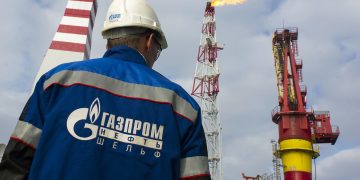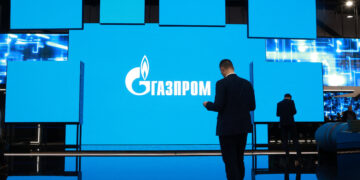Alexander Medvedev Interview to TV Channel “Russia 24” (key notes)
• When the cold weather set in, there appeared worrying reports of gas deficit. The picture drawn from these reports was a far cry from reality. Gazprom was not cutting its supplies to the EU, which could not be true under any conditions. But it was true that both Europe and Russia were hit by frosts.
• Gazprom has increased its gas production to the highest level. We are doing everything possible to satisfy our customers’ demands. Neither municipal sector nor industries or commercial users are constrained. Gas reserves are abundant, and contracts are fulfilled.
• Coming back to our supplies, I would like to review recent history. Winter did not begin in February, anyway. The first upswing of the gas offtake was dated the last week of otherwise mild December, when it grew by over 25%. Gazprom had almost completely (by 99%) satisfied all the demands of our overseas customers at that moment. The last week had added another 20% to the previous maximal offtake in December 2011, and given the situation I described, we have not managed to completely satisfy the increased nominations by now.
• In fact, we are not operating alone. We fully use our underground gas storage facilities (UGS), and our partners have access to their UGS facilities as well, so the standard operations stipulated in the contracts continue. The more so, now all consumers tend to nominate more gas than they probably really need. Another question arises: where are now those famous renewables, and the glorified spot market?
• I could say, for instance, that we were able to supply our customers in Turkey (where it was extremely cold) with more gas that it was foreseen in the contract. We have met their needs, although the exceeding demand for gas was very high. And the same happened in many other cases. But even when we are facing the nomination equal to 100% of contracted quantities, we do have the flexibility to deal with that. The extreme case when we cannot fulfill the nominations leads to standard financial consequences, symmetrical to those applying for the non-offtake of our partners. This is the advantage of the long-term contracts: they include both interdependence and mutual obligations. If one partner is not taking the gas he had contracted, he pays for it accordance with the “take-or-pay” clause. If we, for some reasons (frosts in Russia and Europe) cannot fulfill the nominations in full, the financial consequence follow. This situation is not, however, dramatic, and it reflects the flexibility embodied in the contracts.
• It would be possible to define financial results of what has happened, and assess potential losses, only when the month is completed. We have satisfied nearly all demands in January. In early February, we failed to satisfy the 100 percents of all nominations due to extreme frosts. But it was only last week when the contractions of around of 10%, rarely up to 15% appeared. But again, this does not mean in any way that our customers remain without any gas. Both we and our partners have gas stored in UGS facilities.
• Where are now the advocates of the spot market? The answer is quite clear for me: spot market in Europe showed its inconsistency. It happened to be a quasi-market with no real gas. Otherwise everyone could come there for additional gas and buy it. But on almost every hub, except for, maybe, the British one, there is no physical gas available now, while the spot prices exceed our long-term contracted. This shows that the market is not working correctly and cannot indicate a real pricing situation.
• When the gas was excessively available on the market, everyone was talking of its “liquidity”, but as soon as the deficit happened, it became obvious the spot market is not, and will not be working properly for a long time. The European market is fragmented, there are few gas sources and those are known to everyone.
• So it is an illusion that the spot market is a universal solution. I believe cold weather could help freeze certain hotheads and make them think seriously over the way not to break but to develop the system proven by decades.
• If the EU Third Energy package were fully implemented in Europe, it would have deprived us of the opportunity to deliver gas in full amount, although we do have it at our disposal, to our partners in accordance with long-term contracts. The policy is to deprive us access to transportation facilities which we use for gas shipment in accordance with contracts signed long ago. If the EU Third Energy package were put on stream, then our clients in Germany would not receive our gas because we are allowed only a 50% access to the pipeline which is a natural extension of Nord Stream. Meanwhile, Nord Stream is being filled with gas, conditional to its current technical capabilities, in order to meet the existing gas demand applications. If the EU Third Energy package were operational, we would be deprived of capacities and would fail to deliver gas to our customers.
• It is essential to consider not only the liquidity of the market but also the measures which could deprive the suppliers (not only Russia but other supplier-countries as well) of the ability to meet their existing contractual obligations. Who else but us is in a position to meet these obligations and operate these pipelines? To empty Nord Stream by half? I do not think anyone would do it.
• Weather in Russia is getting warmer, although it is still cold in Europe. Yet, I hope warming up will not distract out partners from a serious analysis of the short-term and long-term consequences of recent developments. We should get ready, reserve transportation capacity, create additional gas storage potential. However, at this very moment there is an attempt not only to deprive us of the right of property of and control over these pipelines but also undermine the fate of underground gas storage facilities. The question is: who would then build and invest in UGS facilities? There are some buyers, and some of our partners were forced to sell these assets. Yet, those who bought these assets do not come up with initiatives on the construction of new infrastructure, neither pipelines nor UGS. It is hardly conceivable that there would be such initiatives, since the new owners need only a good return on their investment and nothing else. While we, as industrial investors, do care about our customers and are ready to keep taking into account their interests.
• Russia is in possession of enough natural gas to supply Europe both in warm and cold weather, but we should not be hindered to deliver it to the customers. We are meeting all of our contractual obligations, and this will remain unchanged.
• As for our relations with Ukraine, the previous year was concluded, unfortunately, with no tangible results in terms of furthering our cooperation. Still, the contracts signed in 2009 can give assurances that gas deliveries would not be ruptured. There is no risk to gas transit and gas shipment.
• In January, when it was still warm, Ukraine claimed that it will buy not more than 27 bcm this year, meaning Kiev intended to reduce volumes by 2.5 times. However, the contract stipulated the amount of gas to be purchased quite clearly, and this could be revised only on the basis of a mutual agreement. When cold weather settled in, Ukraine remembered it had the legal right to demand 50 bcm of Russian gas.
• We made a concession to our Ukrainian partners, and delivered the required volumes of gas exceeding contracted volumes. If there are no agreed supplements to the contract, then all the clauses of the original contract are to be followed and observed.
• Nevertheless, I am confident that not only we shall sign a supplement agreement with Ukraine but that we shall foster a truly large-scale partnership.






